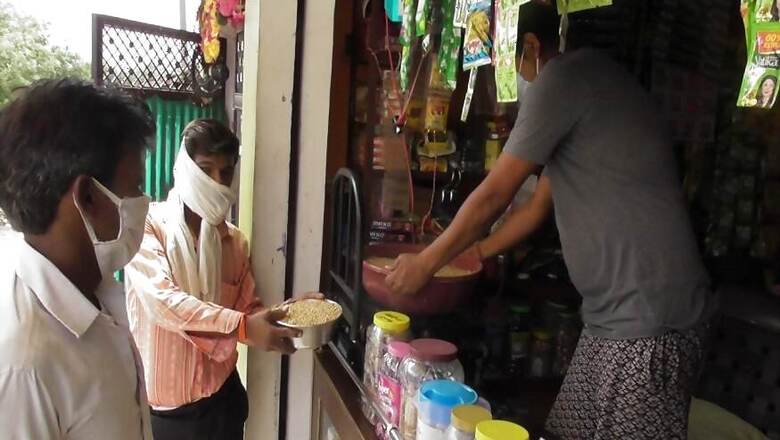
views
Chhatarpur: The prolonged COVID-19 lockdown has resulted in dried up cash reserves, limited ration in households, dealing with an unprecedented crisis, locals from several villages in Chhatarpur district have opted for the age-old barter system.
Farmers in villages have been hard hit during the lockdown as there is a dearth of buyers for produce while their cash reserves have almost exhausted. Amid deepening crisis, residents of Kaidi and Bhagwantpura villages were seen standing in long queues outside a Kirana store to exchange wheat and other grains with items like soap, oil, flour, sugar and others.
“We have no work in the village or in town due to lockdown, so we use at times the grain stocked in our home to exchange goods at local kirana shops,” said Vinod Kushwaha a native of Kaidi village.
Fellow villager and a farmer Hardas Ahirwar reached a kirana shop with wheat in a plastic tub, and said that grain procurement by the government is underway at a slow speed to maintain the social distancing measures, so farmers like him have no choice but to exchange grain with goods at local shops.
Amid lockdown, only 20 farmers are allowed to sell their crops in a single day at government procurement centres in Chhatarpur as elsewhere. The situation is the same at Bhagwantpura village. Here, locals revealed that barter trade has turned into a necessity these days amid stringent prohibitions.
Earlier some videos had gone viral in Bhopal, where people were seen hoarding extra ration through donations and later they exchanged these packets with normal daily need commodities at ration shops in the old city.
Similarly in Gujarat, tribals used the 'sata pata' system — a local name for the medieval practice of barter trade amid the lockdown. Residents of the border areas of Narmada district decided to exchange goods for their survival.
"When the country was not independent, these tribals used to grow sorghum on their land and other crops. That's how they exchanged goods and grains through 'sata pata' system and followed this method of trade. Today, when the tribals are unable to get out due to the COVID-19 epidemic, the practice has resumed in the villages of the district," said Mahesh Vasava, president of the tribal association AMU.


















Comments
0 comment